 GermanTeam 2005 |
Team Contact: Institutes: |
| Team Profile: | see http://www.germanteam.org/ |
| Research Topics: | see http://www.germanteam.org/GT2004.pdf, section 1.2 |
| Team Report: | GT2005.pdf |
|
|
|
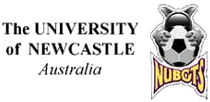 NUbots |
Team Contact: Institutes: |
| Team Profile: | 3rd place at RoboCup 2002, 2003, and 2004, team uses ERS-7 robots |
| Research Topics: |
control, bayesian statistics, machine learning, robot vision, neurocomputing, dimensionality reduction, kernel machines
|
| Team Report: | NUbotFinalReport2005.pdf |
|
|
|
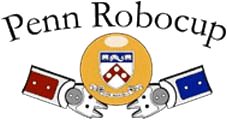 UPENNALIZERS |
Team Contact: Institutes: |
| Team Profile: | 5 years participation, 2nd in ’03 |
| Research Topics: |
Machine learning, biologically inspired sensorimotor processing
|
| Team Report: | UPenn05.pdf |
|
|
|
 CMDash’05 |
Team Contact: Institutes: |
| Team Profile: |
Our Carnegie Mellon CMDash’05 team investigates new research directions and builds upon our CMPack’00-04 and CMTrio’98-99 teams. We have participated in the RoboCup international and local competitions since 1998, placing in the top three places several times. Recently, we were awarded first place in the RoboCup US Open 2005. With CMDash’05, we improve individual robot perception, behaviors, motions, multi-feature based localization, and multi-robot state estimation to address the new much larger and non-walled playing field. CMDash’05 also follows a new research focus on responding to the opponent team, namely through low-level navigation that accounts for other robots and the use of different team strategy plays.
|
| Research Topics: |
Multirobot systems, learning, teamwork, communication, collaboration, vision, perception
|
| Team Report: | CMDash05-report.pdf |
|
|
|
 rUNSWift |
Team Contact: Institutes: National ICT Australia |
| Team Profile: |
UNSW has had amazing success in the Legged League of RoboCup since it first participated in the 1999 competition. To date, they have come second twice and first three times! Unusual within the league, rUNSWift has always had a team of final-year undergraduates working on the project as their thesis topic. This creates an extra challenge as each year we have to start with an entirely new batch of students.
See
http://www.cse.unsw.edu.au/~robocup/2005site/history.phtml for more detail. |
| Research Topics: | UNSW has pursued a number of research topics throughout its RoboCup career. The overarching principle is to pursue research where it is needed, rather than concentrating on one particular part of the soccer agent. This has led to research in many areas from locomotion to machine learning to multi-agent co-operation. |
| Team Report: | link |
|
|
|
 UT Austin Villa 2005 |
Team Contact: Institutes: |
| Team Profile: | Our team started as a class project in January of 2003. At RoboCup 2003 in Padua, our goal was just to participate. We lost all of our official games, though were able to win some exhibitions and achieved the fourth highest result in the challenge competition, including the second highest score in the obstacle avoidance challenge. We finished in third place at the 2004 and 2005 US Opens in April, and reached the quarterfinals of RoboCup 2004. Also see our 2004 report. |
| Research Topics: |
Machine learning, Multiagent systems, Learned locomotion and ball capturing, Robust vision, color constancy, Automatic sensor-action model callibration
|
| Team Report: | link |
|
|
|
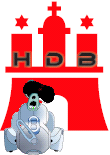 Hamburg Dog Bots |
Team Contact: Institutes: |
| Team Profile: | In 2003 the University of Hamburg, Germany, started a project with the intention to participate in the RoboCup Sony Four-Legged League. Essential part of the project is the integration of solutions of the engineering research from application areas that are part of the Hamburg Institute of Information technology and develop these solutions for further research. The cooperative work of students with different orientations in the information technology is specific for this project and unlike to typical projects with tight focus on a specific topic.
We finished in third place at the 2004 German Open, and reached the quarterfinals of RoboCup 2004. In 2004 some students of the Technical University Hamburg-Harburg joined the Hamburg Dog Bots team. The cooperation of both groups implicated new requirements for the team. The German Open 2005 in Paderborn was the first competition with these new conditions and a test for the world championship in Osaka. In line with the “Germany in Japan 2005/2006” year, our project is registered as number 458 at the German Federal Ministry of Education and Research. The report concerning this aspect can be found at: Projekt_458.pdf. |
| Research Topics: | Image Processing (Low- and High-level Vision), Image Segmentation, Self-Localization, Behavior, Teamwork, Tactic, Motion, Neural Networks and Reasoning with Uncertainties |
| Team Report: | link |
|
|
|
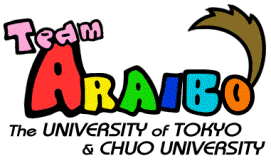 ARAIBO |
Team Contact: Institutes: |
| Team Profile: |
We have participated in Four-legged robot league since 1999.
|
| Research Topics: | |
| Team Report: | ARAIBO_TechnicalReport2005.pdf |
|
|
|
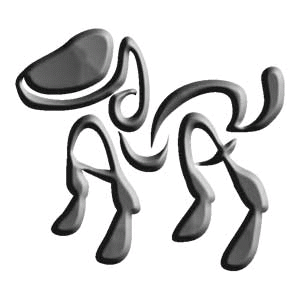 ASURA |
Team Contact: Institutes: |
| Team Profile: |
Our team was organized by KIT(Kyushu Institute of Technology) and FIT(Fukuoka Institute of Technology) in January of 2001. We have been successfully participating in the four-legged league of RoboCup since 2001.
|
| Research Topics: |
Distributed systems, Object oriented programming, Multi-agent systems, and Human-Computer interaction
|
|
|
|
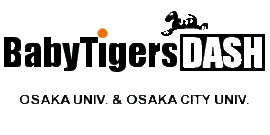 BabyTigers DASH |
Team Contact: Institutes: |
| Team Profile: | Our team was organized by Osaka University and Osaka City University in this competition. We have reconstructed the whole program for ERS-7 based on our past experiences. |
| Research Topics: | Computer Vision, Monte Carlo Localization method, MultiAgent Systems |
| Team Report: | BabyTigersDASH-2005-TR.pdf |
|
|
|
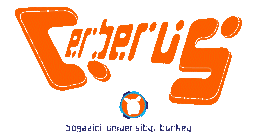 Cerberus |
Team Contact: Institutes: |
| Team Profile: | Team consists graduate and undergraduate students of BU AILAB and an undergraduate student from Marmara University. Cerberus participated in Robocup 2001, 2002, and 2003. |
| Research Topics: | Localization, multi-agent task allocation, path planning and obstacle avoidance, reinforcement learning, POMDP |
| Team Report: | link |
|
|
|
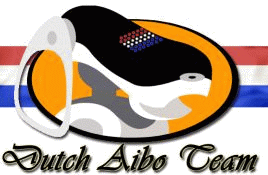 Dutch AIBO Team |
Team Contact: Institutes: |
| Team Profile: |
The Dutch AIBO Team consists of quite a number of professionals, researchers, students and other enthusiasts who have ?caught the virus? of working with real multiple robots in the real world. Academia and industry cooperate and allow us to combine expertise from different research areas such as vision, robotics, artificial intelligence, agent technology and embedded systems in our quest for autonomous collaborative intelligent systems. One means to validate our research is to participate in RoboCup?s 4-Legged Soccer League ? which adds a competitive edge to our research? We have already participated in the German Open 2004, RoboCup 2004 and German Open 2005.
|
| Research Topics: |
Our main research theme concerns ‘collaborative autonomous intelligent systems’, involving challenges such as vision &movement, (shared) situation awareness, self-localization, (strategic) collaboration and human-robot interaction.
|
| Team Report: | DAT2005TechReport.pdf |
|
|
|
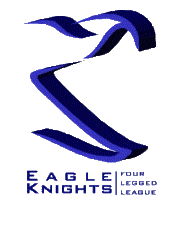 Eagle Knights |
Team Contact: |
| Team Profile: | The Eagle Knights AIBO Team was founded in January 2004. We played our first official games at the US Open 2004. |
| Research Topics: | Biorobotics, Social Cognition, Human Robot Interface |
| Team Report: | EagleKnights4LTDP2005.pdf |
|
|
|
 FC Portugal |
Team Contact: Institutes: |
| Team Profile: | 3 Staff members and 3 Undergraduate students |
| Research Topics: | Multi-Agent Coordination, Flexible Team Strategies: Tactics, Roles and Formations, Strategic Positioning, Multi-Agent Communication, Intelligent Perception, Learning, Automatic Calibration. |
|
|
|
 Jolly Pochie |
Team Contact: Institutes: |
| Team Profile: | see http://www.i.kyushu-u.ac.jp/JollyPochie/ |
| Research Topics: | Machine learning, machine discovery, data mining, image processing, string processing, software architecture, visualization. |
| Team Report: | JollyPochie2005TR.pdf |
|
|
|
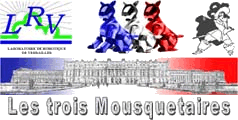 Les 3 Mousquetaires |
Team Contact: Institutes: |
| Team Profile: |
The French team
Les 3 Mousquetaires participates since 1998 in the RoboCup competition. In 1998 the legged league was just an exhibition that took place in Paris at La cité des Sciences. In 1999 the French team won the competition. It ranked second the next year in Melbourne. Fourth in 2001 in Seattle the French team keeps on participating even if the results are not as good as the previous years. |
| Research Topics: | The French Robotics Lab is specialized in legged locomotion, especially in the design of gaits and control, and in low level vision. Thanks to RoboCup the team now focuses on localization and multi-agent behaviors. Currently the coupling between locomotion and vision is investigated. Reports and documents related to the French Robocup participation and research since 1998 can be found at the following site: http://www.lrv.uvsq.fr/research/legged/robocup.php. |
| Team Report: | tech_report_2005.pdf |
|
|
|
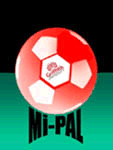 Mi-Pal Team Griffith |
Team Contact: Institutes: |
| Team Profile: | After being formed in late 2002, Mi-Pal has competed in the 2003 and 2004 Robocup competitions in Padova and Lisbon respectively. We have also competed in the Australian Opens of the same period, and remotely at the 2003 German Open.
The team is made up of a broad selection of the Griffith University community. For the 2005 competition we have three undergraduates, one Masters student, three PhD candidates and two Professors actively working on development. |
| Research Topics: | Mi-Pal’s (Machine Intelligence, Pattern Analysis Laboratory) main research focus is related to the Robocup Four Legged League domain. Thus we are interested in Vision Processing, Locomotion, Localisation, Agent Behaviour/co-ordination etc. This year we have also started a project that will use a Non-Monotonic Logic (Plausible Logic) for our Consistency module.
Our research interests extend outside the Robocup sphere and into the homes of people with some form of disability. We are building a system that uses the Aibo’s as a multi modal interface to computing primarily for people with a Vision Impairment. A vision related project that we have had success with is the automatic, real time, three dimensional, tracking of bees as they pollinate Macadamia trees. A grant has recently been approved to investigate robust facial recognition using the Aibo platform. |
| Team Report: | mipalTeamReport2005.pdf |
|
|
|
 SpelBots |
Team Contact: Institutes: |
| Team Profile: | SpelBots is comprised of six students from Spelman College and two faculty advisors. Spelman College is an outstanding, historically black college for women located in Atlanta, GA. Our participation in RoboCup enables us to promote computer science and robotics research and education among our students and community. |
| Research Topics: | Evolutionary algorithms for robot behavior, multi-agent teamwork, object-oriented programming pedagogy using robotics, and robotics education. |
| Team Report: | SpelBotsRoboCup2005TechReport.pdf |
|
|
|
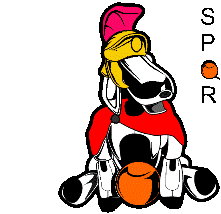 SPQR+Sicilia |
Team Contact: Institutes: |
| Team Profile: | see http://www.dis.uniroma1.it/~spqr/history.html |
| Research Topics: | see http://www.dis.uniroma1.it/~spqr/Legged.htm |
| Team Report: | link |
|
|
|
 TeamChaos |
Team Contact: Institutes: |
| Team Profile: | TeamChaos, formerly Team Sweden, is a multi-university team which has been successfully competing in the four-legged league of RoboCup since 1999. The distributed character of TeamChaos has made the project organization demanding, but has resulted in a rewarding scientific and human cooperation. |
| Research Topics: | Our main scientific focus is the integration of higher level cognitive processes with physical activity in the real world.Some of the distinctive aspects of our approach are: (i) a general, principled architecture for autonomous systems; (ii) hierarchical fuzzy behaviors for fast incremental development of robust behaviors; (iii) fuzzy landmark-based localization for efficient, fault-tolerant self-localization; (iv) an effective cooperative object localization technique (also based on fuzzy logic); and (v) robust vision-based perception, coupled with active perceptual anchoring, for effective object detection. |
| Team Report: | TeamChaos-2005.pdf |
|
|
|
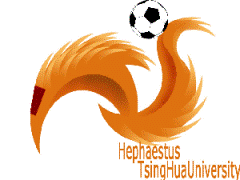 TsinghuaHephaestus |
Team Contact: Institutes: |
| Team Profile: | It?s the first time for us to enter this league, see http://www.au.tsinghua.edu.cn/jgsz/robot/eng/team.htm for details. |
| Research Topics: | Computer visions, mobile robot navigation, see http://www.au.tsinghua.edu.cn/jgsz/robot/eng/paper.htm for details. |
| Team Report: | thuhephaestustechreport2005.pdf |
|
|
|
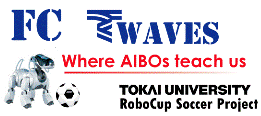 Twaves |
Team Contact: Institutes: |
| Team Profile: | It is the newcomer of the first participation. |
| Research Topics: | Visualization, Reinforcement Learning |
| Team Report: | TeamReportTwaves2005.pdf |
|
|
|
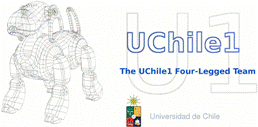 UChile1 |
Team Contact: Institutes: |
| Team Profile: |
Team creation: December 2002.
Former participations: RoboCup 2003 and RoboCup 2004 Main Achievement: RoboCup-2004 Engineering Challenge Award (paper “UCHILSIM: A Dynamically and Visually Realistic Simulator for the RoboCup Four Legged League” by Zagal&Ruiz-del-Solar) Detailed team profile in
http://www.robocup.cl/four.htm |
| Research Topics: |
Evolutionary robotics, adaptive learning, learning from simulations, and robot pose and gaze direction determination. We have also developed UCHILSIM, a realistic simulator for the four-legged league. Relevant publications in
http://www.robocup.cl/four/publications.htm |
| Team Report: | UChile1_Technical_Report_2005.pdf |
|
|
|
